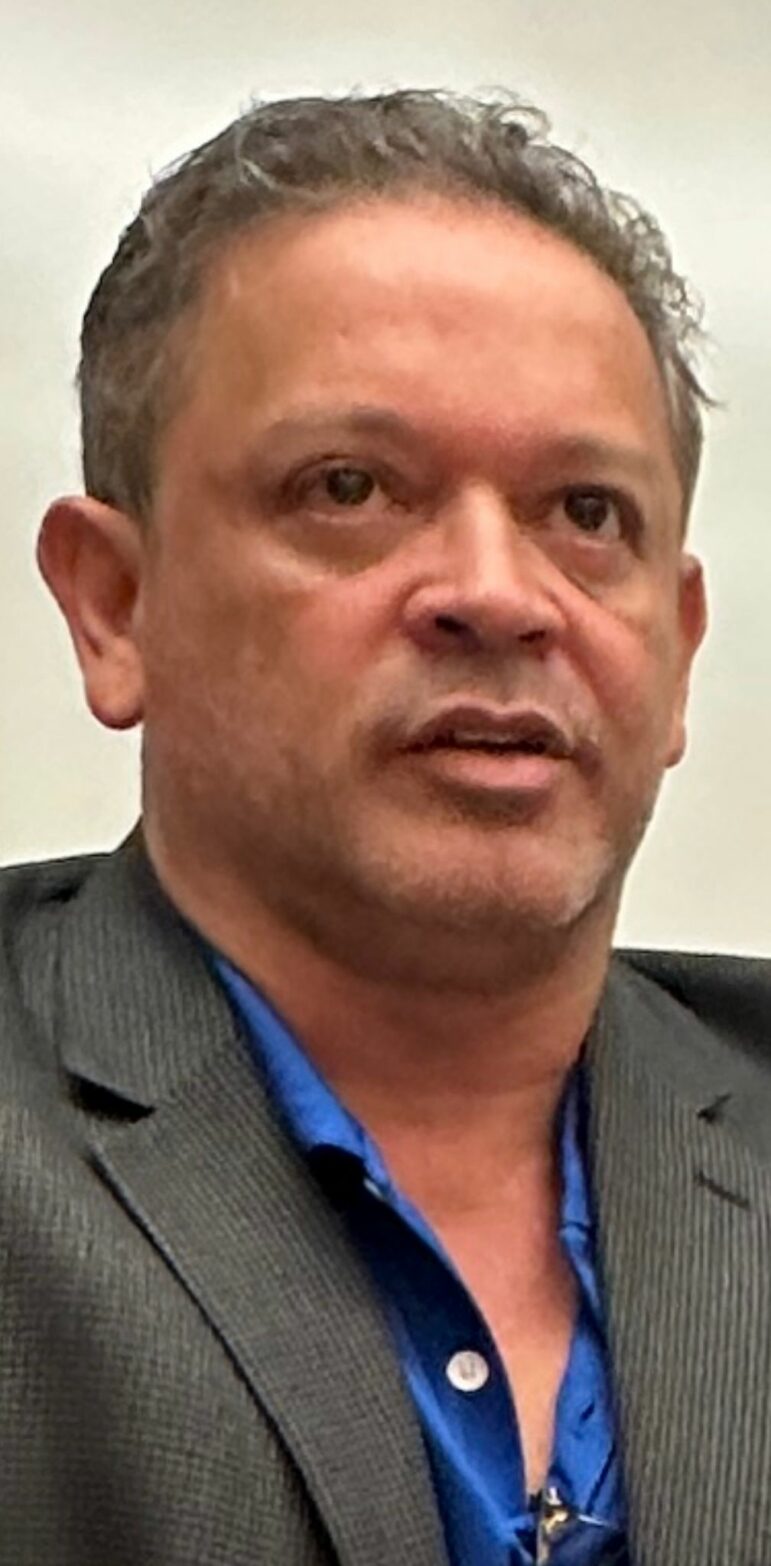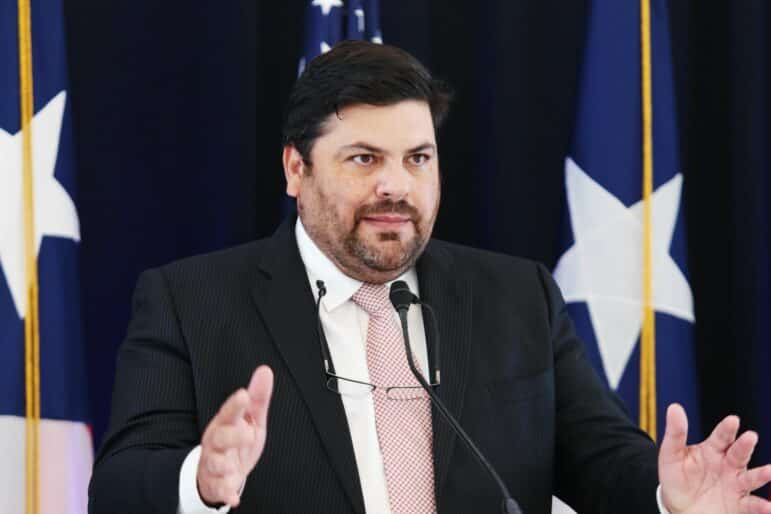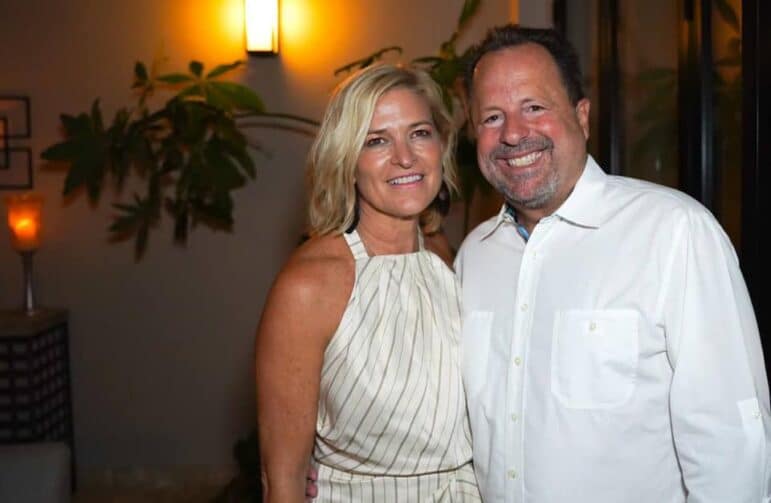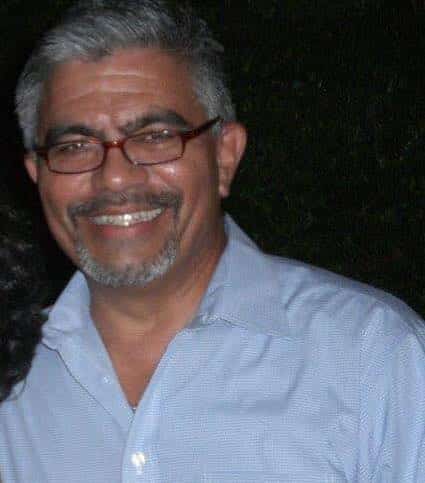A small tech company called SupportPR, owned by a donor and collaborator of Gov. Pedro Pierluisi, has controlled and set the hiring guidelines for tech jobs at the Department of Health (DS) since the pandemic that has exceeded $144 million.
At least half of these payments have gone to companies linked to political donors of the Governor and of other New Progressive Party (PNP, in Spanish) politicians, according to the Office of the Electoral Comptroller’s (OCE) donor registry.
SupportPR’s contracts are part of an onerous pattern in the contracting of health technology services that have little improved performance or data and services available to citizens, an investigation by the Center for Investigative Journalism (CPI, in Spanish) revealed. The investigation found possible excessive charges, duplicated services and unnecessary contracts. Meanwhile, the area of Health Planning, Evaluation and Statistics, to which the crumbling agency’s internal technology division belongs, has an annual budget of only $4.4 million.
SupportPR is also at the center of an investigation by the US. Department of Health and Human Services’ Office of the Inspector General (HHS-OIG) and the Federal Prosecutor’s Office into possible embezzlement of federal funds by this and at least six other companies, CPI sources close to the investigation revealed. The Federal Bureau of Investigation (FBI) has also taken an interest in the case due to a possible crossover with the corruption case of the Pierluisi cousins, according to what the CPI learned. The three agencies said they cannot confirm or deny the existence of investigations into the matter.
Walter Pierluisi, Eduardo Pierluisi, and their firm, American Management and Administration Corp. (AMAC) pleaded guilty last April 14, to one count of embezzlement of $3.7 million in federal funds from the U.S. Department of Housing and Urban Development (HUD) for the administration of public housing projects in Puerto Rico from 2014 to August 2022.
The HHS-OIG’s investigation includes contracts from Orsys Consulting, Nagnoi, Intervoice Communication of Puerto Rico, Health Gorilla, NTT Data EAS, and Digheontech. These companies, together with SupportPR, have amassed almost $70 million in contracts since 2020.
Neither SupportPR’s General Manager, Rubén Vázquez Nieves, nor its Executive Director, Yadira Galarza Berríos, were available for an interview, said the company’s lawyer and ex federal prosecutor, María Domínguez Victoriano.

Courtesy photo
Digheontech and Health Gorilla were the only two companies that were available for interview. Peter Díaz, vice president of Digheontech, admitted that the HHS-OIG has requested information and assured that they are collaborating. However, he affirmed that if the investigators do their job correctly, “we’re not going to be the target because we have not done anything illegal.” Digheontech was one of the main companies that worked with the monitoring and daily publication of COVID-19 data during the peak of the pandemic, as well as in the development and management of the entry control system for infected visitors at the island’s airports.
Meanwhile, Javier Jiménez Jirau, vice president of Health Gorilla for Latin America and Government Affairs, said the company is not being investigated by federal authorities and that no information has been requested from them nor has any employee been interviewed.
The vice president of Digheontech — which has been doing technology work for the DS since 2009 through its predecessor company, UAI Caribbean — argued that Vázquez Nieves tried to force them to outsource to private companies. Díaz noted the usual thing in the industry is that each company chooses its own technicians according to the rate quotes that they get.
“Rubén [Vázquez Nieves] had been at the agency for a while. When [Secretary] Carlos Mellado [López] arrived, he stayed at the agency. But at the time, he [Vázquez Nieves] began to take control of all the Department of Health’s technological initiatives, which not only included the pandemic, but also other areas such as Medicaid, Medicare, and other areas,” Díaz said.

File photo
“What we thought was not good, nor moral or legal to us, was that an adviser was saying specifically which companies should do what and that those companies in turn had some link or partnership with him,” Díaz said, adding that the DS ended up canceling the contract with Digheontech, in his opinion, for not lending himself to these moves. The version of the Department of Health’s Chief Administrative Officer, Esdras Vélez Rodríguez, and his former IT Chief Rafael Gralau, is that they canceled the contract because it was no longer necessary.
They mention meetings with Andrés Guillemard
Meanwhile, the vice president of Digheontech said, although he has not personally participated in meetings with Governor Pedro Pierluisi’s brother-in-law, Andrés Guillemard Noble, he knows of contractors who have participated and who confirm that the lawyer is the force behind Vázquez Nieves and the allocation of technology contracts in the agency. Six sources in separate interviews confirmed this information to the CPI. Guillemard Noble and Mellado López are neighbors and friends.
“Testimonial proof has come to me that he [Guillemard Noble] has great control over this group of companies that got into the Health Department. They even recommended that we go through him [to get subsequent contracts]. The company decided not to accept that type of recommendation because it didn’t seem like something appropriate to me, something moral,” Diaz said.
Four sources who spoke with the CPI put Guillemard Noble in meetings on technology issues and the disputes in the DS with Vázquez Nieves and other contractors, both at his Miramar neighborhood offices and at the Vanderbilt hotel in Condado. The Governor’s cousin, Walter Pierluisi, accused by federal authorities, who helped expedite payments in the Department of Health, was also allegedly present at one of those meetings, according to sources.
Guillemard Noble declined to answer the CPI’s questions on this issue. Vázquez Nieves also did not answer whether he had met with Guillemard Noble.

Photo taken from Facebook
Díaz also confirmed the information provided by internal sources with technological expertise regarding the misuse of money in the awarding of contracts because the DS asked to redo work in the technology area that had been successful in the past and was working. Likewise, the DS lost expensive equipment and platforms developed due to a lack of maintenance. For example, the DS scrapped the dashboard showing COVID-19 data for 2020 and hired Orsys to replace it with a new display, which contained even less information than the original.
“Either the heads of the Department of Health are being negligent in discarding existing technology, technology that they already bought, technology that they can implement and have already implemented, to buy new technology to do the same, or there is some motivation behind this that I don’t know about. I cannot say for sure what it is, but it definitely entails spending public funds, federal funds, unnecessarily,” Díaz said.
How SupportPR arrived at the Department of Health
SupportPR’s history with the Department of Health began in the summer of 2020 during Governor Wanda Vázquez Garced’s administration. In April of that year, in the heat of the health emergency due to the pandemic, the then Secretary of Health, Lorenzo González Feliciano, brought in Johnny Colón González to address the agency’s administrative matters.
This official had directed the Public Health Response Preparation and Coordination Office, better known as Bioseguridad, during González Feliciano’s first tenure in the Department of Health, in 2012. Colón González almost immediately contracted SupportPR to conduct “a forensic audit of information systems” and provide general consulting services, Colón González himself acknowledged in an interview with the CPI. During his career in public service, Colón González has held several positions of trust and as a contractor under past and present New Progressive Party administrations.

Photo taken from Facebook
Colón González said that Vázquez Nieves approached him during the summer of 2020 to help him with a project and to contract SupportPR to handle matters in the IT office. González Feliciano agreed to hire him. However, the Secretary never saw the forensic audit for which SupportPR was hired because he was no longer present at the Department of Health when the company handed it over to Cólon González, on December 18, 2020, the latter said. Although González Feliciano was still the Secretary, he also did not know that Colón González extended this contract for another month through an amendment, on December 30, 2020, 24 hours after the change of government administration following the election and during the Christmas recess, he admitted.
Less than a month later, on January 26, 2021, Secretary Mellado López signed another amendment changing the distribution of hours to SupportPR so that it would charge the same amount, rendering fewer hours, and adding a clause for this contract to be administered directly by the Deputy Secretary of Administration. The move eliminated the role of the director of the Office of Information Technology and Technological Advances (OIAT, in Spanish), an official who in the original contract was assigned the duty of certifying the work done. Neither the then assistant secretary, Colón González, nor the current one, Vélez Rodríguez, have expertise in technology.
González Feliciano did not agree to be interviewed for this story.
Colón González, who admitted to the CPI that he was a friend of Mellado and stayed in his position with the change of administration, justified his decision to extend the contract by pointing to the need for continuity in technological services, given the precarious situation of the OITA’s staff and expertise.
When asked how he evaluated SupportPR’s services, Colón González said he was initially satisfied with the company’s work and that “the work got done,” but that the dynamics with the company changed after Mellado López took office. He said Vázquez Nieves started to align himself with companies and people close to the new government administration with whom he did not agree, and which coincided with a substantial increase in the amount of their contracts.
“Secretary Mellado’s [López] new group took over, and Esdras Vélez made the decisions on administrative matters, and basically [had] the decision-making power, establishing priorities,” he said.
Mellado López kept Colón González in a position of trust as a special assistant but put him in charge of federal funds and four months later he removed him from that position and assigned him to draft contracts for the Medical Services Administration (ASEM, in Spanish), where he currently is, said Colón González. The Secretary did not respond to the CPI’s question as to why he removed the official from these posts.
One of the improper acts that Colón González allegedly witnessed was that, after a couple of months heading the federal funds office, Vázquez Nieves and his partner commissioned an audit — unnecessary, he said — to a technology company that, in his opinion, was not qualified. As a result, DS paid $200,000 in federal funds from the Centers for Disease Control and Prevention (CDC).
“The funds were used in a way that I consider improper, and I let the CDC know so. And that was the straw that broke the camel’s back because that was why the Secretary asked me to leave,” he said.
Unnecessary, hefty contracts to party insiders
Six sources with direct knowledge of the hiring, who spoke on condition of anonymity, said in separate interviews that many of these contracts are unnecessary and are simply awarded to people connected to the majority political parties. Some of the assigned tasks are important, but they are assigned to companies or people unable to do the job adequately. This inability forces them to subcontract services to other people or companies to do the work they were hired to do.
“They give it to a friend, who in turn calls another friend to help them, and the job never gets done,” said one of the sources.
Despite the allegations of the former deputy administrator of the DS, Colón González, the CPI investigation found that the problems with the company had been evident since it was initially signed up under his tenure. An analysis of SupportPR invoices, as well as testimonials from internal sources who requested anonymity, point to possible inflated charges and unnecessary work at the agency.
The former administrator of OIAT, Alexander Quevedo, confirmed the CPI’s analysis by pointing out that this contract, like that of Digheontech, was imposed on him by Colón González and negotiated behind his back. He assured that, as Chief of Technology of the DS, he asked Colón González for the proposals from both companies to evaluate them, but he never got a response and shortly after he was removed from this position by Secretary González Feliciano. He remained in another concurrent position that he held as Medical Health Informatics Coordinator, a seven-year appointment.
“During the pandemic, perhaps, Digheontech’s services were necessary. The services of Mr. Rubén Vázquez [SupportPR] were not necessary then, nor in terms of the amount that was agreed,” he said.
Quevedo was fired abruptly from his last position without explanation through a letter signed by current Governor’s Chief of Staff, Noelia García, three weeks ago, he told the CPI. Mellado López did not specify why he was fired. He only said that Governor Pierluisi removed the official from the post. Three sources from the DS indicated that González Feliciano had already begun the process to remove Quevedo from the position, through the still legal director of the agency, Miguel Verdiales, and that the attorney received the document “ordering Quevedo’s removal” signed by the then Governor Wanda Vázquez Garced. Mellado López was asked why he did not continue the process and was asked for a copy of the document, and the doctor replied: “The former governor did not dismiss Mr. Quevedo.”
As of press time, Vázquez Garced had not responded to a call or text message on the matter.
More power to SupportPR through amendments
On January 29, 2021, one day before the second amendment to the SupportPR contract expired, Colón González amended the company’s contract for the third time. This time it was awarded $2.7 million, a figure that nearly triples the original contract.
Overnight, SupportPR went from having had $684,000 in contracts over six years — from 2014 to 2019 — in the Family Department, in the Puerto Rico Aqueduct and Sewer Authority, and in the municipalities of Toa Baja and Naranjito; none in Health, to obtain almost $10 million in less than three years — from 2020 to 2023 — in the Department of Health alone.
SupportPR is owned by Rubén Vázquez Nieves, a collaborator of several political campaigns of Governor Pierluisi, and Yadira Galarza Berríos, a lawyer close to Mellado López. Vázquez Nieves, an engineer by profession, is also a childhood friend of Pierluisi’s brother-in-law, Andrés Guillemard Noble, according to four sources with direct knowledge of the relationship.
He was also a donor to Pierluisi’s gubernatorial campaign and supported with applications forecasting voting results and projections, the sources said. Galarza Berríos was Mellado López’s legal adviser in 2012 when he was the Patients’ Ombudsman, and she has also donated to Governor Pierluisi.

Courtesy photo
Billing doesn’t match the results
The CPI investigation revealed that this company’s million-dollar billing is not compatible with the work carried out nor with the staff that the company says carried out the tasks. For example, as a result of the first contract for which SupportPR billed $1 million in four months, the company provided the Department with a 53-page forensic audit, two policy and procedure manuals for two divisions within the Department, a “Guide for the management of systems and equipment, and other prevention measures against the spread of COVID-19” and a “Presentation to the then Secretary with recommendations and implementation plan,” according to a procedure document that the CPI obtained.
In addition, the invoices include charges for thousands of hours of administrative work, monitoring and follow-up, and project management, tasks that are not the reason for contracting technological services, for rates that are up to 10 times higher than what the Department of Health and other government agencies pay their employees for this type of work. An analysis of the first three invoices submitted by the company revealed 2,024 hours for this type of administrative work, more than a third of the total amount of the invoices. In contrast, for project execution, 288 hours were charged, and for software analysis, only nine hours.
According to the invoices, as well as the billing and payment reports submitted to the Department of Health, from August 2020 to July 2022, SupportPR billed from $120,000 to $915,000 per month for services allegedly provided by up to 40 people charging rates between $50 and $125 per hour. At least four internal sources said that SupportPR has only one technology expert, the owner himself, Vázquez Nieves. The CPI carried out a search of all the people on whose behalf SupportPR invoiced the Department of Health and was only able to find two who publicly identify themselves as company employees: Vázquez Nieves and Galarza Berríos.
A third person, a former FBI agent and former security adviser to ousted Governor Ricardo Rosselló Neváres, Héctor G. González Arroyo, was also listed as one of the company’s permanent employees, sources said, but he was a contractor who, according to the Register of Corporations, has a security company, International Intelligence Group.
A company contractor stated that SupportPR “does not have any employees, they work with contractors, project by project.”
“Support hires contractors, corporations, and/or individuals in need of contract service,” Attorney Domínguez Victoriano responded in writing on the company’s behalf when asked if they had any employees.
SupportPR’s contracts include contradictory and vague clauses about subcontracting. On the one hand, the DS prohibits the subcontracting of “essential” tasks, but does not detail what this means, and on the other, it allows the subcontracting of “personal and professional services.”
The CPI found that most of the people that SupportPR records on the invoices as providing more than 40 hours of services per week to the DS through the company, identify themselves in their professional and social media profiles as employees of Orsys Consulting, which is the other technology company that at one time had $6 million in contracts with the DS.
Among them, is one of the two owners of Orsys, Willian Suárez Sagayo, who consistently appears on SupportPR invoices providing up to 250 hours per month for services to the DS. The head of IT at the time, Rafael Graulau, told the CPI that he believed that Suárez Sagayo worked for SupportPR and that he was unaware of his relationship with Orsys. Graulau was responsible for overseeing both contracts. Two other agency programmers were also in charge of supervising the 37 contracted companies.

Photo taken from Facebook
The CPI contacted Suárez Sagayo, also a Pierluisi donor, but he refused to answer questions about the apparent conflict of simultaneous billing for his work with both companies. He was also unavailable to explain how some of his Orsys employees were also included in SupportPR’s invoices.
Other people appearing on SupportPR invoices identify themselves as employees or former employees or contractors of companies like Triple S, Lift, Systech Consulting, Deeplogics Labs and even the Puerto Rico Electric Power Authority (PREPA). Some identify themselves as owners of companies. None mention SupportPR in their work history.
“It was him [Vázquez Nieves] and three others, but they billed as if there were 100 of them,” said a source with direct knowledge who asked to remain anonymous. Four other sources separately confirmed this information and even said that when Colón González signed the service contract, Vázquez Nieves did not even have his own office and that he worked from the Department of Health.
When the CPI asked Graulau about the fact that SupportPR billed for services allegedly provided by dozens of people, some of them, Orsys Consulting, he was surprised. He said that it’s not normal for a company contracted by the DS to subcontract people who work for another company contracted by the DS.
“I have seen situations where they can subcontract [personnel] from another company but subcontracting someone who owns a contracting [company], I can guarantee that I haven’t [seen] that,” Graulau said.
From a review of the invoices, the CPI also detected thousands of dollars in invoices for services rendered by individuals whose professional training appears incompatible with the services rendered. This is the case, for example, of González Arroyo who studied marketing, and has dedicated himself to security consulting professionally, but through SupportPR he billed hundreds of hours to the Department of Health for doing data analysis.
González Arroyo did not want to answer questions on the matter, but a SupportPR contractor told the CPI that the former agent has no training in technology and data management, and his duties were administrative and following up on assigned work.
On the other hand, the CPI also found that the Department of Health assigned repetitive, redundant tasks and amendments that exponentially increased SupportPR’s billing power for certain tasks. For example, one of the amendments allowed them to bill up to $150,000 for participating in in-person or virtual meetings. Prior to that, they could only charge up to $32,000 for attending meetings.
In addition, two contract amendments allowed the company to bill additional hours for forensic audit tasks, even though SupportPR had already completed the audit and delivered a report of findings on December 18, 2020.
Neither the Chief Health Administration official, Esdras Vélez Rodríguez, nor his boss and former head of technology could specify to the CPI what other audit services SupportPR performed after delivering the report, if any.
“Well, if we’re talking about forensic auditing as such, to my knowledge, I only involved them in one forensic audit process. I cannot tell you about several, I don’t know about that,” said Graulau, who in the interview said he is only aware of a single forensic audit.
The two amendments that allowed SupportPR to bill additional hours for audit tasks were signed by Mellado López and Colón González, on January 26 and 29, 2021, respectively.
The final report of the alleged SupportPR audit, which does not have the usual rigor and detail of an audit, according to three experts consulted who requested protection of their identity, makes accusations that would have “catastrophic” consequences for the DS if they are not addressed. However, they are situations vaguely described and without detailing or supporting evidence.
A forensic auditor consulted for this story, who asked not to be named because the company he works for bans them from making public statements, said that a forensic audit must meet ethical and professional standards. Among them, to investigate a particular matter around a suspected deviation from norms, by a certified professional in the subject evaluated, against a regulatory framework or specific professional practices, and all this must be described in a methodology. In addition, the audit must come to a concrete conclusion and assign responsibilities, if applicable. The final report of the alleged forensic audit of SupportPR does not comply in any way with these standards.
“They called me many times to do the same thing [a general evaluation] in agencies, and I said no. That’s unethical,” the auditor said.
SupportPR’s “forensic audit” goes into evaluating areas that were not requested, such as the Office of External Affairs which manages between $450 million and $800 million in federal funds that the Department of Health has received annually since 2020. The report dedicates almost a fifth of its pages to propose “new projects.” It lists 181 “new projects” in a wide range of program areas, most unrelated to technology. SupportPR’s proposals cover areas ranging from care for the elderly to hospitals and laboratories, as well as establishing a contact tracing system and redoing the COVID-19 data dashboard, systems that existed and had been operating during the most critical stage of the pandemic.
Vázquez Nieves and Galarza Berríos declined a request for an interview requested through Attorney and former federal prosecutor María Domínguez Victoriano, who dedicates a large part of her practice to criminal cases. Although she clarified that she is a lawyer for the corporation, not for Vázquez in her personal capacity, she told the CPI that she will be responding to any requests for information that the CPI would like to make to Vázquez.
The CPI asked Domínguez Victoriano for an interview with the chief executives to discuss all billing issues and work rendered to the DS in exchange for the almost $10 million in contracts, as well as the allegations of his political connections and influence in the DS raised in this story, but Domínguez Victoriano said they would not give an interview.
“We feel confident that Support and its principals have not engaged in any criminal conduct, and we will continue to collaborate with the investigative efforts,” said Domínguez Victoriano in written statements.
Mellado López responds but doesn’t answer
Mellado López said through his communications director, Lisdián Acevedo, that he would not give an interview to the CPI about this story.
He delegated to his chief administrative officer, Vélez Rodríguez, to the head of OIAT, Hiram Rivera, and to the former head of OIAT, now an employee of the Medicaid Program, Rafael Graulau, to answer the CPI’s questions. The CPI sent questions in writing, but most of his answers were evasive or incomplete. Among them, if he is Guillemard Noble’s friend and who recommended Vélez Rodríguez for the position. The answer was: “He was hired after an evaluation process based on his many years of experience in public administration.” He also did not specify why he removed Colón González from his position.
He assured that Guillemard Noble “doesn’t have any contracting authority” in the Department of Health, and that Walter Pierluisi (the Governor’s cousin) does not have any role in the agency either.
All defended SupportPR’s contracting as appropriate and Vélez Rodríguez assured that all the agency’s technology contracts, during his tenure, have gone to bids, when current regulations require it, without the intervention of political influences or favoritism. However, despite having had 13 days to deliver it, they did not provide information and evidence of which of the 37 contracted companies went through a competitive process.
Vélez Rodríguez acknowledged that the HHS-OIG has made innumerable requests for information, but he assured that he was unaware that there’s an ongoing federal investigation into the technology contracts.
“The Secretary, since he is a transparent person, is in constant communication with the HHS-OIG. So, the type of conversation that he has had or has not had, is not something that we are aware of, but the fact that he often talks with the agency is something normal and typical,” he added when asked if Mellado López has been interviewed.
Meanwhile, Graulau acknowledged that when he began at the OIAT “there was a lot to improve,” and said he kept hiring SupportPR because “he was very familiar with the setup at the OIAT, the needs and resources were very competent.” He also said, despite the shortage of personnel at OIAT, during his tenure, he was able to adequately oversee SupportPR and all companies.
Hiram Rivera, current director of OIAT, told the CPI that the Office has 12 employees, including him, and acknowledged that more workers are needed.
“We don’t have enough staff to meet all the technological needs,” he said.
On the other hand, Graulau recognized that many of the expensive DS technology contracts can and should be assumed internally by the agency at a lower cost, including the purchase of its own servers and data storage space.



